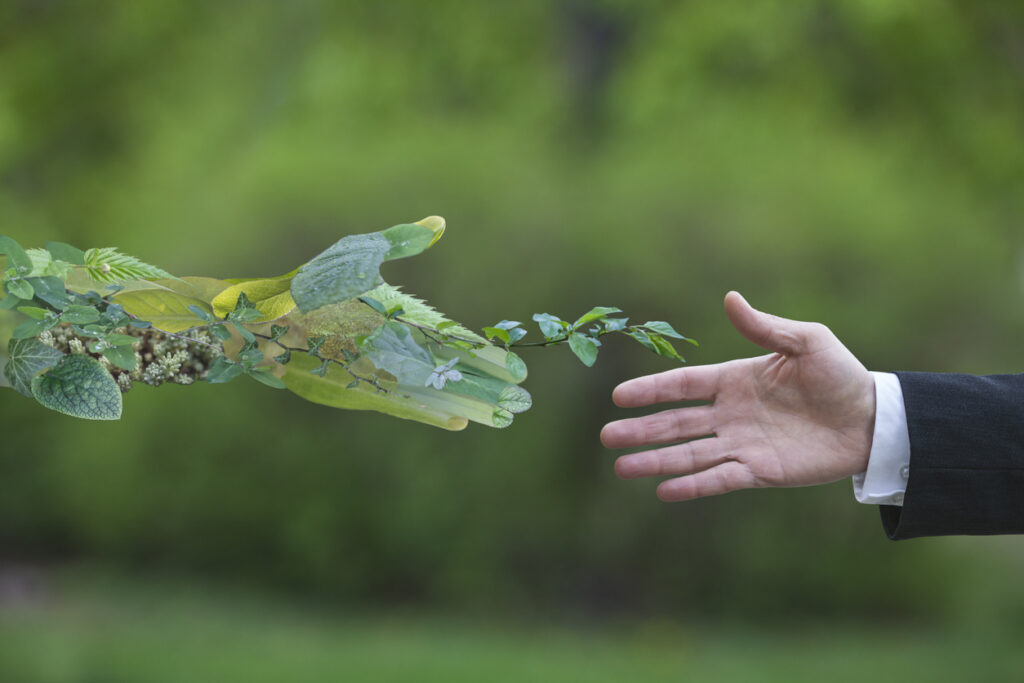We are now in the Anthropocene age of geological time, the time when humans changed everything. The surface of the earth has been altered by farming, mining, civic infrastructure, urban sprawl. We rubber-stamp our activities through pollution, through the radioactive legacy of atomic power and human-induced acceleration of global warming. Our species has brought about the sixth extinction event, with the rate of vertebrate extinctions increasing a hundredfold over the last century – and there’s a way to go before our full impact is clear.
We exert enormous influence and power over our environment. With this influence and power (as always, from an ethical perspective) comes responsibility.
Even if you feel that the claims of climate change are exaggerated, the precautionary principle must be adopted: ‘is there any possibility whatsoever that these predictions are correct?’ Our duty to future generations compels us to ask, and conclusion is clear that whatever your bias, the risk cannot be totally dismissed.
Therefore, if we care about the risks for future generations, our duty is the same as if the worst of the science-based predictions were correct. We must take every necessary measure to ensure such appalling eventualities cannot come about.
We exert enormous influence and power over our environment. With this influence and power comes responsibility.
Individual action
So what can we do as individuals?
Most importantly, we must remain hopeful. Our actions count. They may seem insignificant when it’s just us we’re looking at – but multiply what we do as individuals by tens of millions and suddenly we are seeing world-changing impacts.
Secondly, there are changes we can make in our everyday lives which, when scaled up, will certainly make a difference. Here are some of the most effective:
- Go car-free.
- Stop or reduce your travel by plane. (Electronic conferencing is the way of the future!)
- Change to a green energy supplier or, where possible, install solar panels, heat exchangers or wind turbines.
- Adopt a plant-based diet.
- If you need to own a car: buy an electric or a more carbon-efficient model/car share/strive to reduce your mileage.
- Stop using open fires or wood burning stoves.
- Retain, re-use, and recycle.
If you’d like to check your personal carbon footprint click here.
Sustainability in the workplace
The observations above and the moral objectives outlined in the first article in this series indicate a moral duty to campaign for sustainability. As a first step towards this we should encourage the take-up of the individual measures outlined above, including:
- Offering cycle to work schemes.
- Encouraging car shares.
- Offering vegan alternatives in canteens or kitchens.
- Publicising the importance of reducing our personal carbon footprint.
More specific suggestions for making our workplaces greener might be:
- Introducing plants and trees where feasible: on roofs, in courtyards, in car parks or other available spaces.
- Ensuring recycling facilities are available and publicised, encouraging recycling targets.
- Offering at-cost charging facilities for electric cars.
- Striving to improve office energy efficiency through measures such as replacing all lighting with LED and using energy-efficient appliances.
- Adopting an out-of-hours shutdown policy for lighting, heating and all electrical appliances.
- Sourcing sustainable energy supplies. Are solar, wind or heat-exchange energy sources feasible?
- Reducing office temperatures for heating, increasing them for cooling. Even a one-degree change in either case can significantly reduce energy use.
- Minimising paper use / setting printer defaults to double-sided printing.
- Replacing older toilets with low-flow designs and adding low-flow aerators to taps.
- Replacing disposable cups or kitchenware with re-usable alternatives.
These are crucial changes for the workplace – but there are further actions we will wish to pursue for businesses as a whole.
Taking action as a business
Given the inertia of human society and the vast environmental impacts already taking place it would be easy to be despondent. It is therefore crucial to emphasise how capable we are as a species. I’ve noted this before in this series. In just the last hundred years or so our achievements have been astounding. To name but a few:
- Eradication of smallpox and near-eradication of polio.
- Harnessing atomic power.
- Micro- and nano-engineering.
- Gene modelling.
- Reductions in hunger and poverty throughout the world (though much is still to be done).
- The internet, social media, our phones.
- AI.
As a species we have shown ourselves capable of marvels – and business has played a key role in this.
It is crucial to emphasise how capable we are as a species… our achievements have been outstanding. Business now needs to play an equally critical role in our transition to a sustainable world.
Here are suggestions for how we might meet this challenge:
- Embrace sustainable change. It can be exhilarating, profitable and structurally beneficial as well as ethically sound.
- Think laterally. Are there dividends that might arise from imaginative green transformation?
- Strive to source your supplies from environmentally friendly sources.
- Reduce or eliminate waste products – or, where unavoidable, see if they can be redirected locally for re-use.
- Look for ways to minimise disposable wrappings and containers.
- Embed the moral imperative to ‘nurture and protect the biological world’ into the charter, articles, constitution or mission statement of your business.
- Reflect this imperative in the policies and processes that underlie the daily activities of the business.
- Include responsibility for sustainability in job descriptions at exec and senior management levels.
- Educate colleagues in the value of sustainability as an on-going process.
- Ensure your bank and pension funds are investing in environmentally benevolent practices; if not, move to banks or funds that do.
A common response to detailed proposals such as these is defeatism. ‘Look at China or India! Their actions will far outweigh ours! What’s the point?’
I would answer this on three counts:
- Even if our contribution is small, it nevertheless remains ‘a contribution’, a part of the eventual whole. It increases the likelihood of success, and – who knows – it may even be our tiny input that edges humanity across the threshold into a safer place.
- Why not lead by example? To do nothing sets no example at all. To do our utmost sets a fine example – which other businesses, communities and nations may follow.
- Whether our contribution is significant or otherwise, morality is never a case of waiting for others to do good before we do good also. For businesses wishing to act ethically it is our duty, regardless of what others do, to take the first moral step, the second and the third.
Lastly, and on a purely self-interested basis, it is worth noting that many of the measures outlined above will actually generate cost savings for businesses, in addition to enhancing their standing in society as a whole. Furthermore, doing nothing may eventually prove to be, even for business, the most expensive option of all.
Taking action as HR
What is the role of HR professionals and teams in all of this? To do what they do best. To facilitate professionalism and integrity throughout any changes made by the businesses they serve; to lead by example; and to seek imaginative and practical ways for our businesses to assist in transitioning to a sustainable world.
[cm_form form_id=’cm_65a14c3f5da64′]
Coming soon
In my next article I discuss whistle blowing and transparency, and ask, ‘is transparency beneficial or detrimental to organisational wellbeing?’
In the meantime, please use the comments section below to join in our conversation about workplace ethics and I will respond as promptly as I can.







3 responses
If you enjoyed this article,
If you enjoyed this article, please take a look at my latest book:
Short Conversations: During the Plague
https://www.amazon.co.uk/Short-Conversations-About-Everything-Matters/dp/B089M5BGGF
“Short Conversations” evolved on Twitter. For that reason, it’s a book about everything – because that’s what you find on Twitter: just about everything.
It asks questions like:
– Can we fix a broken media?
– Can we become cleverer?
– Is a better world possible?
– Is eating meat a crime?
– Is a virus killing our world?
– Are there reasons for hope?
All these questions are there on social media, with a thousand different answers to each one.
And that’s a problem…
With so many answers on offer, how can we tell which are the right ones?
Well, I’m going to surprise you… Good answers can be found.
If you go back to basics and build up from there; if you use both common sense and logic; if you root your thinking in the evidence; and if you assert the moral context – then you’ll find answers with heft; answers you can count on; answers you can use.
So, “Short Conversations” is about these questions and many others. It asks questions, it identifies problems, and it offers answers.
Answers on which you can count.
If you’re interested in
If you’re interested in ethics on a broader scale, please take a look at my two books:
“Intelligent Ethics” (recommended by former Archbishop of Canterbury Rowan Williams): http://www.amazon.co.uk/Intelligent-Ethics-Luke-Andreski/dp/1794618732
And “Ethical Intelligence”: http://www.amazon.co.uk/Ethical-Intelligence-Luke-Andreski/dp/179580579X – a guide to clear thinking and ethical decision-making in troubled times.
It would be great to hear your feedback and insights.
For an expanded version of
For an expanded version of this article, please visit the brilliant Phase 3 Insights Hub: https://phase3.co.uk/ethics-in-the-workplace-the-environmental-question/